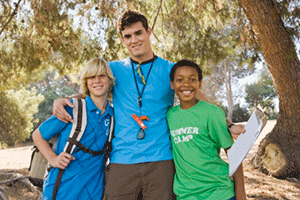 April is Child Abuse Prevention Month, and with planning for summer camps in full swing, now is a good time to think about how your camps can help spot and prevent child abuse.
April is Child Abuse Prevention Month, and with planning for summer camps in full swing, now is a good time to think about how your camps can help spot and prevent child abuse.
The following tips are from the American Camp Association and have been reprinted here with permission.
- Understand the facts about child abuse. According to the U.S. Department of Health and Human Services, 1 in 4 girls and 1 in 6 boys will be the victim of abuse before they reach age 18. Consider your camp population related to these statistics. Children arriving at your camp may already be the victim of abuse. Check out this toolkit for help on recognizing the signs of abuse and steps to take if a camper reveals abuse to you.
- Report any suspicion of abuse to the authorities. While state laws vary, in general, as camp professionals serving in loco parentis, you must call the proper authorities in your state when allegations of abuse are revealed. Make sure your staff understands that it is not just the law; it’s in the best interest of campers to get them the support they need. Do not attempt to "handle it" yourself. Connect with trained professionals immediately. It's both the right thing to do and the law.
- Establish a robust screening process for all staff and volunteers. Your screening process should be multi-faceted and include a criminal background check, voluntary disclosure statement, reference checks, verification of previous work, and a personal interview. See here for advice and tips on how to set your thresholds for acceptable criminal backgrounds and conduct thorough screening for staff and volunteers.
 Train your staff and volunteers well. Provide training on what child abuse is, how to recognize the signs of abuse, how to prevent abuse and how to respond when there is suspicion of abuse.
Train your staff and volunteers well. Provide training on what child abuse is, how to recognize the signs of abuse, how to prevent abuse and how to respond when there is suspicion of abuse. - Establish and enforce guidelines for acceptable interactions between staff and campers, and between campers and other campers. Your supervision and counseling policies should ensure that one staff person is never in seclusion with one camper. Staff needs to understand that there can be no physical contact between campers and staff. (If you allow such contact as hugs and high fives, you need to be very clear about what is acceptable.) If your camp serves a special needs clientele where personal care of the camper is required, establishing interaction guidelines is even more imperative.
- Establish and enforce supervision practices that promote camper safety. We know that allegations of camper-to-camper abuse can come in those brief moments in time when staff were not directly engaged with campers — non-structured program time (time between programs, meals, etc.) shower time, trips to the restroom, changing for the pool, etc. It is imperative that your staff is trained to be even more vigilant during these vulnerable times. In addition, ensure that the ratio of staff to campers is age appropriate and meets industry standards. Encourage employees/volunteers to actively interact with the youth to maintain adequate supervision and monitoring.
- Teach and model respectful behavior. If your staff are overheard “teasing” or telling sexually suggestive jokes to one another — what example does that set? Be clear with your staff that you have a zero tolerance policy on any type of abuse and other inappropriate behaviors, such as physical interaction between staff, telling stories about their love life, no sexual innuendo, etc. Consider a dress code that eliminates the possibility for sexually suggestive clothing. Practice role playing, and have staff demonstrate appropriate behaviors, including ways to confront someone being inappropriate. Learn more here.
How do your summer camps train staff to help prevent child abuse? What best practices would you share with others?
About ACA
The American Camp Association® (ACA) is a national organization; 9,000 members strong, it is actively working with over 2,700 camps. ACA is committed to collaborating with those who believe in quality camp and outdoor experiences for children, youth, and adults. ACA provides advocacy and evidence-based education and professional development, and is the only national accrediting body for the organized camp experience. For more information, visit www.ACAcamps.org.

